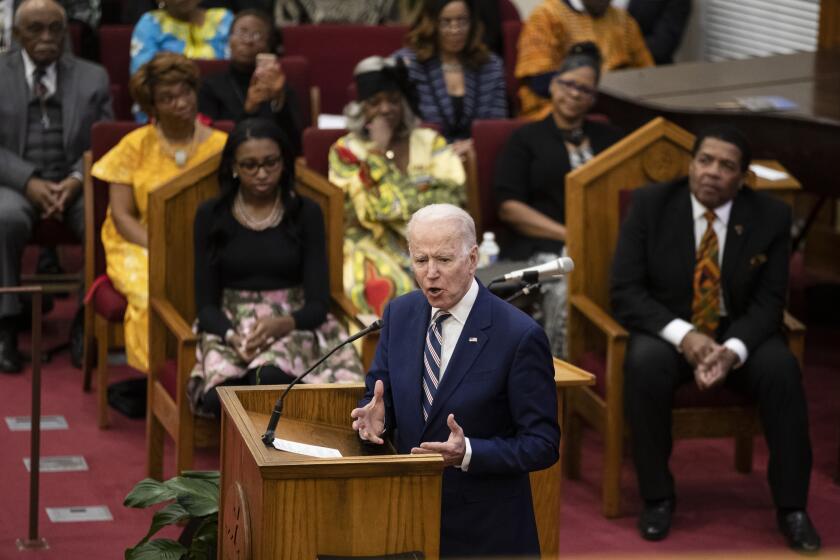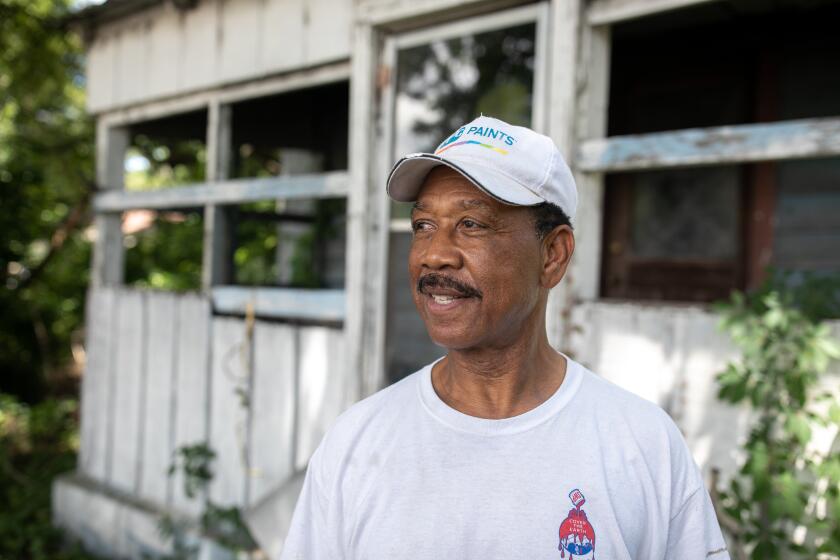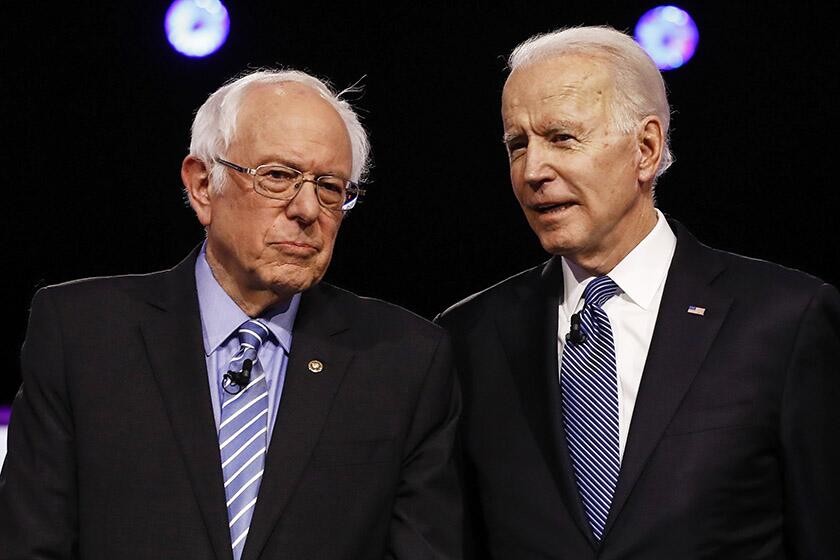Black voters are desperate to beat Trump but wonder if Democrats have what it takes
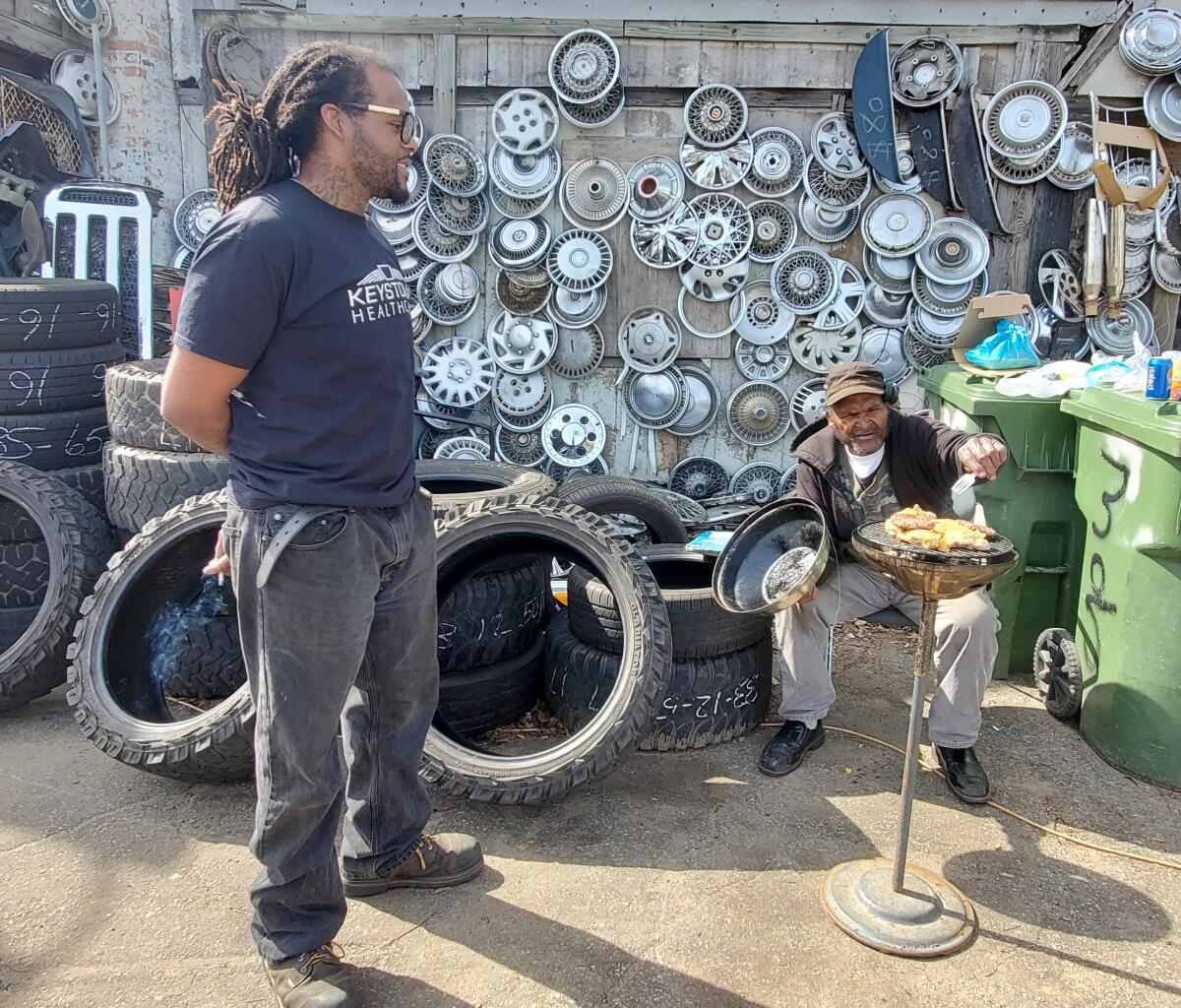
- Share via
CONWAY, S.C. — Sometimes, in a dramatic flourish, a politician will urge voters to cast their ballot as though their very life depended on it.
For Alester Pryor, that’s no exaggeration.
“I want to make America great again, but it can’t be great as long as he’s in the White House,” said the 72-year-old retiree, who readily praises Jesus but won’t let the name of the man in the White House pass her lips.
It’s not just President Trump’s antagonistic relationship with black Americans.
For Pryor, the prospect of another four years under the current administration poses an existential threat, resulting in irreparable harm to the rule of law, the environment and, especially, people of color.
On Saturday, she’ll seize the chance to act on her fears by voting in South Carolina’s Democratic presidential primary, a crucial step in the Democratic presidential nominating fight. But Pryor, like many black voters in the state, questions whether any of the Democrats appreciate the stakes, or what they’ll face running against Trump in November.
“I don’t think they’re ready for the fight,” Pryor says. “It’s like they’re ostriches. Their heads are buried in the sand.”
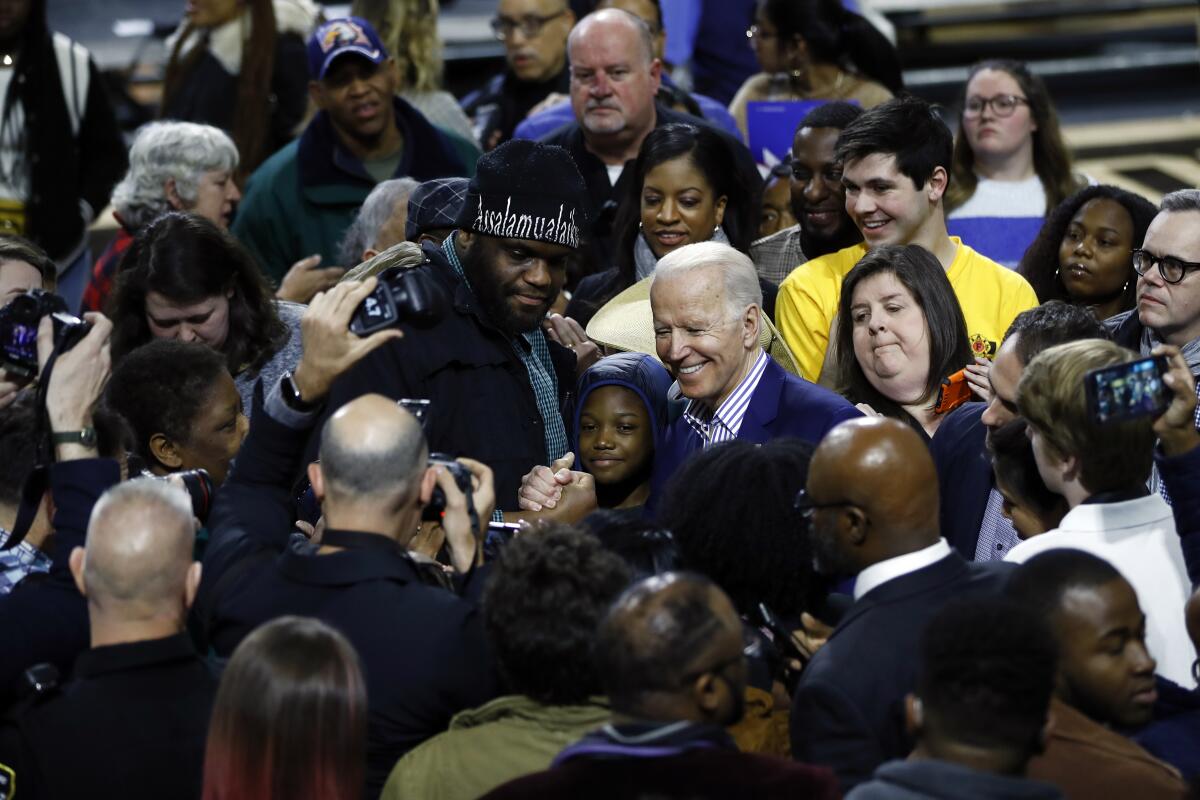
Much of the focus on Saturday’s primary revolves around the comeback attempt of Joe Biden, who hopes a win here can stop Bernie Sanders’ ascendance and launch the former vice president into Tuesday’s coast-to-coast round of balloting.
But for black voters weighing their choices, the election goes beyond such tactical considerations. The election is more personal and consequential than any they can remember. And for that reason, many find the current field of candidates wanting.
As Melvin Wright Sr. cooked burgers and chicken thighs on a homemade rotating grill outside the tire shop that bears his name in the town of Florence, he confessed that he’s not impressed with the half a dozen Democrats scuffling for his support.
“Trump — he ain’t worth a dime,” Wright said as he sat on an unseasonably cool Sunday morning in front of a garage adorned ground-to-roofline with shiny silver hubcaps.
The problem for the Democrats, the 65-year-old said, is that their efforts to energize South Carolina’s black voters don’t add up to much either.
Wright said that Biden, for one, could’ve boosted his chances by doing more to understand why this election is so important to African Americans.
Wright and his son, Melvin Wright Jr., who came out to join his father by the grill, saw Biden as the party’s best hope for unseating Trump, because of his decades of experience in public office and his service alongside President Obama, and because he’s at least framed his campaign as a fight to save America’s soul from a president who’s eating away at its core values.
Biden himself often boasts of his long-running ties within the black communities in the South. Still, with so much at stake in this election, Wright Sr. said even that doesn’t feel like enough.
“I know he has it in him,” he said. “But he needs to do a better job of talking in a way that relates to us.”
Trounced by Bernie Sanders in Nevada, Joe Biden is under pressure to finish first in South Carolina, where black voters dominate the primary electorate.
The question of how to relate and build a meaningful connection to the 60% of South Carolina Democrats who are African American is a complicated one.
At a gospel music “extravaganza” in Conway, at the Mason Temple Church of God in Christ, Democratic candidates were invited to celebrate primary week and woo congregants. Alester Pryor was there.
But when the audience of about 80 rose to join in on “Lift Every Voice and Sing,” a song calling for social justice and black uplift, not one of the candidates was in the pews.
“I’m a little disappointed that they didn’t think enough of us to be here,” Pryor said.
History weighs on the minds and shapes the outlook of black voters in this state, and across the South, in a way that people who aren’t from here, and who aren’t black, might find hard to grasp.
The first shots of the Civil War rang in 1861 down the coast from here, in Charleston, a meticulously preserved colonial city located on a river that spills into the Atlantic.
Descendants of slavery who visit the city’s historic downtown must walk past a towering waterfront memorial celebrating the heroism of Confederate soldiers who died in the war fought to keep blacks enslaved.
The debate over reparations for slavery is getting new attention through the 2020 presidential race. For the descendants of slaves in South Carolina, it’s personal.
African Americans continue to suffer from the legacy of slavery — mass incarceration, entrenched poverty, bad schools, segregated neighborhoods, voter suppression — all problems the Democrats say they want to solve.
In this corner of the old Confederacy, many black voters see in Trump a racist leader who trades in the toxic attitudes and language they know so well. Black activists in the 1960s risked arrest and violence at the hands of their state’s segregationists to fight for civil liberties and voting rights. Now many see voting as crucial to keep the past from repeating itself.
In 2015, a white supremacist shot to death nine members of Mother Emanuel AME Church in Charleston’s old quarter. In photos posted online, he’d posed with a Confederate flag.
“It’s so bad in the country right now that it’s almost like a civil war — of words — and it gets more divisive and more inflammatory every day,” says John Wright, an Army veteran and community leader in the historic black settlement of Old Village just across the river from Charleston. He is no relation to Melvin Wright.
John Wright’s ancestors founded the village in the late 1800s after being freed from slavery.
Moss-drenched live oaks and cottages with wide porches fill the compact, waterfront neighborhood. But most of the residents today are white.
Many of the original black families that owned the homes sold or lost them because they couldn’t afford rising property taxes as white families with more income moved in, says Wright, who spends most of his time working with local officials to save what remains of the district.
South Carolina’s younger black voters are feeling underwhelmed by the Democrats’ promises to fix the sorry state of the union, too.
As Demekia Johnson and Marilyn Finney left a rally with Massachusetts Sen. Elizabeth Warren on Wednesday on the campus of South Carolina State University in Orangeburg, they said they were tired of the “mayhem,” as Finney put it, that’s gripped the nation since Trump became president.
Warren told the hundreds of students gathered in an auditorium at this historically black university that fighting back against injustice — and Trump’s racism — was “an act of patriotism.”
Johnson, a 21-year-old biology major from the state capital of Columbia who’s in her senior year, and Finney, a 23-year-old graduate student who’s studying business administration, agreed.
Finney said she’s from nearby Union, which she described “a very Confederate town” where racism is alive and well.
The two students said they were still undecided about whom to vote for in the primary, but no matter who it is, they want a Democratic nominee who’ll bring the country back to its senses, and restore a sense of calm.
But Johnson’s not sure that the party will get its own act together in time to overcome Trump.
“Is their plan solid?” she asked out loud. “I don’t know.”
Joe Biden is the likely Democrat nominee to face President Trump now that Bernie Sanders has suspended his presidential campaign. Meet the candidates.
More to Read
Get the L.A. Times Politics newsletter
Deeply reported insights into legislation, politics and policy from Sacramento, Washington and beyond. In your inbox twice per week.
You may occasionally receive promotional content from the Los Angeles Times.
